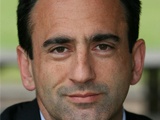|
|
TODAY.AZ / Politics
Nagorno-Karabakh conflict is important itself independently of any other issue - assistant secretary of State
10 December 2009 [18:05] - TODAY.AZ
 Nagorno-Karabakh conflict is important itself independently of any other issue, stated Philip H. Gordon, assistant secretary of State for Europe and Eurasian affairs,at a short briefing for Caucasus journalists under the "US-Europe partnership" discussion at the Council on Foreign Relations in Washington DC.
Nagorno-Karabakh conflict is important itself independently of any other issue, stated Philip H. Gordon, assistant secretary of State for Europe and Eurasian affairs,at a short briefing for Caucasus journalists under the "US-Europe partnership" discussion at the Council on Foreign Relations in Washington DC.Speaking about the conflict, Assistant Secretary said that US is "actively engaged as well on Nagorno-Karabakh issue and we are actively engaged in the OSCE Minsk Group. The co-chairs are in the region right now, because we think this is mutually important, but it has long been mutually important, and it is mutually important independently of any other issue."
According to Mr. Gordon, this issue is important "not because we see it as a link to Turkey Armenian relationship, but because it could be also a contribution to peace and stability in the region, that both Azerbaijan and Armenia would benefit from. It is something we care about and would like to see succeed."
US official noticed that Washington supports "the Turkey-Armenian normalization process as well. The protocols, we would like to see them ratified. We think this would benefit Turkey and Armenia and help develop peace and stability in the region."
He has also said that "If both of these processes - Nagorno-Karabakh peace process and Turkey-Armenia normalization - succeed, then it would be a historic development for the region".
Answering Armenian journalist's question on whether he thinks that Turkey is turning its back on West, Gordon said: "We have had an intensive discussion with the Turkish government. They maintain their interest to join EU, which is an aspiration that we support. They certainly seem to value their strategic cooperation with the US; their prime-minister was here just this week talking about his aspiration about using Obama's term of model partnership. When Turkey comes to the US and talks about how we can work together on how we can work together on challenges, that don't seem to me as country that turns his back to the West and goes into some other direction."
During his speech at the Council on Foreign Relations, Gordon also said that United States were disappointed about Turkish position towards EAIA sanction towards Iran: "We have some differences in our positions with Turkey. We informed Turkey that we would like a stronger support in this issue from Turkey."
During his recent visit to Washington Dc Turkish prime-minister Erdogan called on all the countries to abandon the nuclear weapons, and not only Iran.
Commenting on this statement, Mr. Gordon said that "We asked Turkey for assistance in this issue, so that Turkey influences Iran."
Talking about the energy security in Europe, Gordon stressed that "This is one of the main points of cooperation between US and Europe."
He also mentioned that Washington is positive about START follow-up document: "I don't want to put a time-table on START follow-up treaty, but both US and Russian governments have committed to have it done, and we remain to be hopeful that it will be possible."
Philipp Gordon also talked about US-Russian relations, especially on Georgia's example. He mentioned that the two countries still have different approach towards situation in Georgia: "We will not recognize South Ossetia and Abkhazia," he said.
/Trend News/
URL: http://www.today.az/news/politics/58103.html
 Print version
Print version
Views: 1298
Connect with us. Get latest news and updates.
See Also
- 18 January 2026 [13:25]
President Ilham Aliyev paid tribute to 20 January martyrs [PHOTOS/VIDEO] - 17 January 2026 [22:50]
German media highlight Azerbaijan’s first gas deliveries to Germany and Austria - 16 January 2026 [13:13]
Moscow must restrain its own mouthpieces like Solovyov. - 16 January 2026 [11:11]
Fuel shortage has hit Yerevan - what prevents it from turning to Azerbaijan? - 15 January 2026 [18:29]
Baku emerges as a pivotal hub in Washington’s Eurasian strategy - 15 January 2026 [15:27]
President Ilham Aliyev signs law on transport and freight forwarding activities - 15 January 2026 [14:25]
Pashinyan hails TRIPP framework, reaffirms political will on Azerbaijan–Nakhchivan connectivity - 15 January 2026 [14:14]
Is this Russian soft power or heavy-handed influence? - 15 January 2026 [12:12]
Azerbaijan launches desalination of Caspian water - innovations and international experience - 15 January 2026 [11:11]
Armenia is reforming the army: revanchists are worried
Most Popular
 Fuel shortage has hit Yerevan - what prevents it from turning to Azerbaijan?
Fuel shortage has hit Yerevan - what prevents it from turning to Azerbaijan?
 Moscow must restrain its own mouthpieces like Solovyov.
Moscow must restrain its own mouthpieces like Solovyov.
 China halts electricity imports from Russia as energy trade declines
China halts electricity imports from Russia as energy trade declines
 Azerbaijan Cultural Center, Kokand State University discuss educational cooperation
Azerbaijan Cultural Center, Kokand State University discuss educational cooperation
 Machado presents Trump with Nobel Peace Prize during White House meeting
Machado presents Trump with Nobel Peace Prize during White House meeting
 Int'l Mugham Center publishes major work by Uzbek thinker
Int'l Mugham Center publishes major work by Uzbek thinker
 Middle Corridor shows why process matters more than maps
Middle Corridor shows why process matters more than maps
